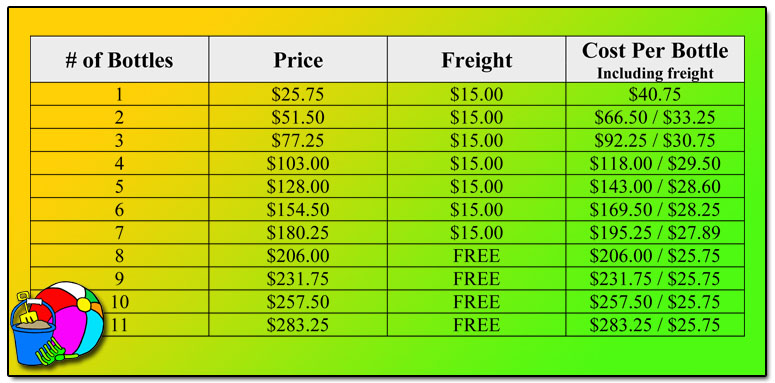




Another warm greeting to all of my valued Customers, Case Club Members and Friends receiving this July edition of our monthly newsletter!
A huge thanks to all those who continue to support A-M B-Well Inc. by providing themselves and their loved ones the benefits of the highest quality pharmaceutical grade fish oil. Remember we have both PGFO Capsules as well as our hugely popular Liquid Gold!!
This month's read is an excerpt of an interview with Dr. P. Calder Ph.D. on the effects of fish oil helping with rheumatoid arthritis.
Please enjoy!
Fish oil can reduce Rheumatoid Arthritis
March 9, 2013 by Nutrition Remarks
Anti-inflammatory effects of fish oil help Rheumatoid Arthritis
patients
Nalin Siriwardhana, Ph.D., interviewed Prof. Philip Calder, Ph.D., D.Phil., R.Nutr., from Institute of Human Nutrition and Human Development and Health Academic Unit, Faculty of Medicine, University of Southampton, UK.
Prof. Philip Calder, a renowned scientist who researches the impact of dietary fat on human health specializing in inflammation, conducted a systematic review and concluded that omega 3 fats can help reduce symptoms of rheumatoid arthritis. He and his co-worker Elizabeth Miles, Ph.D., reviewed the scientific evidence published over the past 25 years and concluded that the anti-inflammatory potential of omega 3 fatty acids found in fish oil supplements can reduce the severity of various symptoms of rheumatoid arthritis including pain. Further, they explained that these improvements due to omega 3 fats are associated with reduced production of inflammation-causing mediators such as cytokines, pro-inflammatory eicosanoids and reactive oxygen/nitrogen species (ROS/RNS).
In healthy joints, cartilage and synovial fluid cushions the joints, thus preventing bones rub together. This allows easy and comfortable movements.
In Rheumatoid Arthritis, joints are inflamed due to immune reactions which results swelling, pain and loss of function. This inflamed condition can cause joint destruction and deformity.
Nutrition Remarks interviewed Prof. Philip Calder and a simplified version of the interview is given below:
Question from Nutrition Remarks: What causes rheumatoid arthritis?
Answer from Dr. Calder: In simple terms, arthritis is inflammation (attack from the body’s own immune system) within the joints. Technically, arthritis is an autoimmune disease with a genetic predisposition. In Rheumatoid Arthritis, the body’s immune system attacks its own tissues including joints. When inflammation occurs within the joints, it can lead to swelling, pain and loss of function of joints. More specifically, inflammation involves the movement of white blood cells into the joints where they release many types of unwanted/damaging chemicals including pro-inflammatory eicosanoids and cytokines.
Question: Why is Omega 3-6 balance important?
Answer: One of the major families of inflammation causing compounds are eicosanoids produced from omega 6 and 3 fatty acids. However, eicosanoids produced from omega 3 fats result in less inflammation compared to those produced from omega 6 fats (arachidonic acid). Many anti-inflammatory drugs, including some used in rheumatoid arthritis, work by stopping the formation of inflammatory eicosanoids from arachidonic acid. On the other hand omega 3 fatty acids interfere with eicosanoid production from arachidonic acid (they do this by replacing arachidonic acid in cell membranes). In addition to giving rise to less inflammatory eicosanoids, omega-3 fats increase production of another family of chemicals called resolvins and protectins. These omega-3 derived chemicals play an important role in switching off inflammation.
Question: Compared to anti-inflammatory drugs, where does fish oil stand as a therapeutic option?
Answer: Compared to therapeutic drugs, omega 3 may take longer time to act. However, the effect of drugs can last only for short time while the effects of omega 3 may last for a long period of time. It is important to acknowledge that the effects of omega 3 will be weaker than those of drugs. However the evidence is that omega 3 fats are effective in providing some long term relief of symptoms when taken on a regular basis at the correct dose.
Question: Can you briefly explain the mechanism/s that omega-3 act against Rheumatoid Arthritis?
Answer: Like I mentioned, omega-3 fats produce less inflammatory eicosanoids (e.g. prostaglandin E3/PGE3) compared with highly inflammatory produced from omega-6 fats (e.g. prostaglandin E2/PGE2). When higher levels of omega-3 fats are present in the body they will not only produce less inflammatory eicosanoids but they also competitively block the production of pro-inflammatory eicosanoids from arachidonic acid. In addition, T cells (a type of white blood cells) are known to be highly activated in rheumatoid arthritis and are associated with inflammation and omega-3 fats seem to dampen the activity of these cells, probably by changes in the cell membrane composition.
Question: What are the most promising doses and how long does a patient need to take fish oil?
Answer: Like in any other conditions, in order to receive benefit there is a need to maintain sufficiently high levels of omega-3 in the body. Therefore, the best option would be to have more omega-3 fat containing foods (e.g. fish) and to lower the intake of foods providing omega-6 fats. Taking fish oil or similar supplements regularly will help to maintain the healthy omega-3 levels. It is important to understand that the effects will take weeks to months to be seen. Also, there will be variation between patients in terms of the time needed to see an effect.
Question: How can dietitians, nutritionists and other health professionals use your published information to recommend fish oil and other fish products?
Answer: Advice and recommendations need to have a robust evidence base. Our review contributes to that evidence base. Information published by us demonstrates a modest but consistent benefit of omega-3 fats in Rheumatoid Arthritis. The reviewed information was obtained from clinical trials conducted and reported over 25 years.
Question: Is there any other important information that we did not discuss so far?
Answer: Inflammation is important in many human conditions and diseases. Therefore the benefits of omega-3 are likely to be quite broad.
This news release was based on the original scientific article published by Drs. Calder and Miles in the British Journal of Nutrition. Additional general background information was acquired from PubMed and NIH sources.
Original work; Miles EA, Calder PC (2012) Influence of marine n-3 polyunsaturated fatty acids on immune function and a systematic review of their effects on clinical outcomes in rheumatoid arthritis. Br J Nutr107 Suppl 2: S171-84.
Dr. Calder is an expert researcher in the area of influence of dietary fatty acids on cell function and human health, in particular in relation to cardiovascular disease, inflammation and immunity.
Written by Nalin Siriwardhana, Ph.D.
http://www.nutritionremarks.com
Copyright © 2013 Nutrition Remarks. All rights reserved
CLICK HERE AND GET YOUR PGFO TODAY!!!






5 ml. = 5 capsule
125 ml. / 4 ozs. per bottle
CLICK
HERE
to read label ingredients

90 capsules per bottle
CLICK
HERE
to read label ingredients




A-M B-Well™ Omega-3 PGFO has been third party tested according to the parameters established by the Council for Responsible Nutrition (“CRN”) and the World Health Organization (“WHO”) for its potency and purity by http://www.ifosprogram.com/ and receives a 5 Star rating.
Omega-3 PGFO capsules and Omega-3 Liquid Gold are identical in price, being $25.75 per bottle. Below is a chart listing the prices on the Order Page for Canada and U.S. Retail. The price shows the total price for 1 to 11 bottles with the freight included, then breaks it down by the price per bottle. 8 to 11 bottles are shipped freight-free.
The second chart called Case Club Membership lists the prices on the Order Page for Canada and U.S. Wholesale. This chart is to show you how much money you can save per bottle if you order by the case (12 bottles) and also join the Case Club. You will further note that the second chart also shows the total price for bottles for 12, 24 and 36 bottles based on Regular and Case Club prices, then breaks it down by the price per bottle. As you can see, you are paying considerably less per bottle by ordering in bulk.





Case Club membership is
$25 per annum.
Club membership gives you a 5% discount on all
your case purchases for one year.
A good idea for customers purchasing 2 or more cases per year.
Visit
our Order Page and choose your Country.
You will be able to choose between Omega-3 PGFO Capsules and Omega-3 Liquid
Gold or order both together.
Warmest Regards,
Anne-Marie

